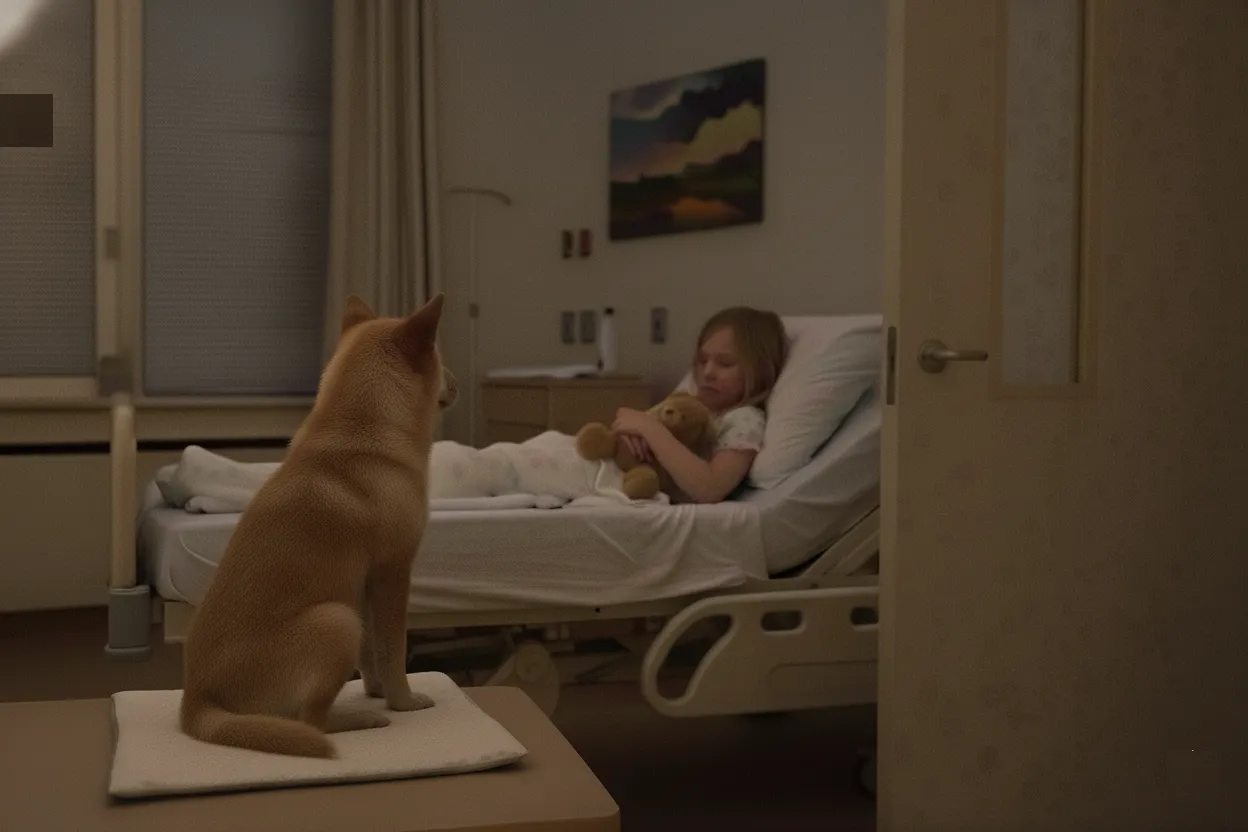The visit was supposed to last ten minutes. That was the rule. But when the clock ran out and the handler called him, Milo didn’t move. He stood by Lily’s bedside, muscles tight, eyes fixed on her chest. When a nurse tugged his leash gently, he let out a low growl.
The sound wasn’t loud, but it rippled through the room. The other children’s laughter outside stopped. “Easy, boy,” someone murmured, stepping closer. Milo’s lips curled slightly—not in anger, Maya thought, but in warning. His eyes never left Lily, who sat frozen, pale and still, her small hand gripping the blanket.
When the handler finally pulled him away, Milo resisted until the last possible second, trembling all over. He whined once, sharp and mournful, before disappearing down the hallway. That night, Lily’s heart monitor blipped unevenly. A nurse noticed and adjusted her medication, whispering later that maybe the dog had known.
Two weeks earlier, the program had just begun. Maya had arranged for therapy dogs from the local shelter to visit the children’s ward once a week. The plan was simple: a few friendly faces, wagging tails, a little happiness. The hospital needed it. So did she.
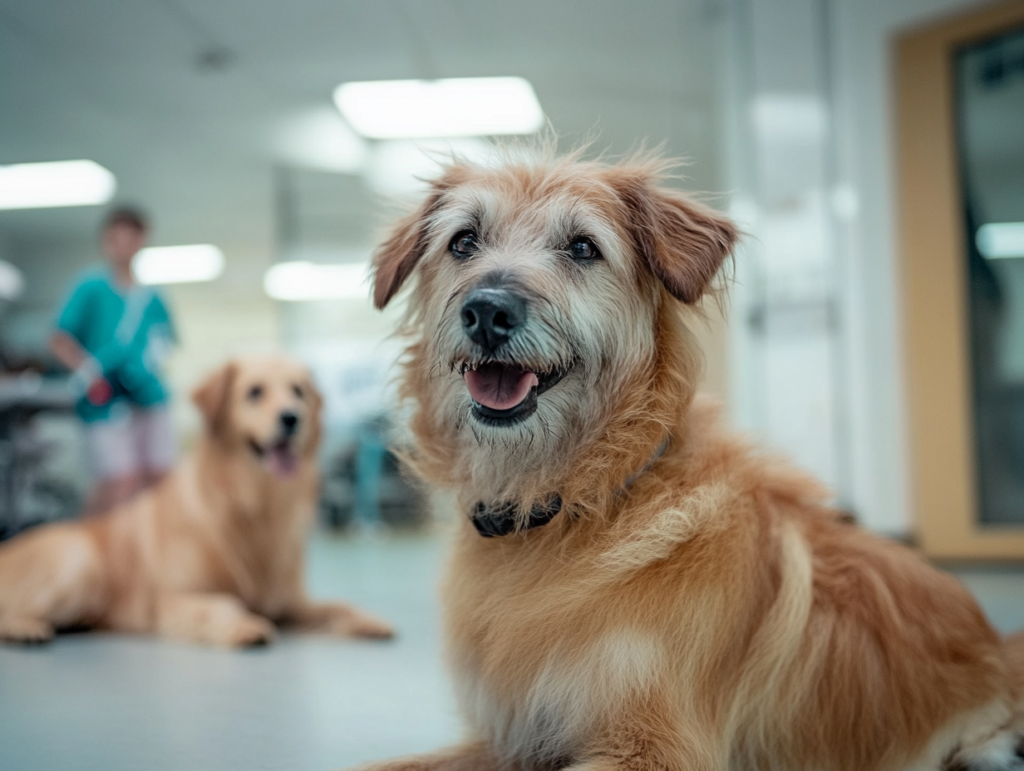
Milo arrived that first day with the rest of the dogs. He was a brown mixed breed with quiet amber eyes and a calm posture. He didn’t bark or jump, just waited, watching. The shelter worker smiled proudly. “He’s the gentle one,” she said. “Everyone loves Milo.”
And everyone did, until they reached Lily’s room. The moment he saw her, Milo froze in the doorway. His tail dropped, ears forward. He whimpered once, then stepped back as if unsure. Staff laughed softly, saying he was nervous. But Maya thought she saw something else flicker behind those eyes—recognition?

Lily was ten. The doctors said her recovery after a heart transplant was going well, but emotionally, she’d shut down. She hardly spoke, kept her hands curled to her chest, and woke crying most nights. Her parents tried stories, music, and prayer, but nothing reached her.
When Milo finally entered her room the next day, it was different. He walked straight to her bed, paused, then sat down carefully at her side. He didn’t nudge her or ask for a pat. He just watched her, alert and still, as though waiting for a signal only he could hear.

From then on, he chose her room every time. If handlers tried to guide him elsewhere, he pulled toward Lily’s door until they gave in. His visits weren’t playful like the others; he stayed quiet, tense, focused. Every sound she made seemed to anchor him in place.
After each visit, Lily’s color improved, her breathing steadied, and her monitor lines evened out. Maya began writing it down: “Milo—protective. Won’t leave this patient.” Soon the question spread through the ward, whispered by nurses, parents, even doctors: Why was Milo attached to her, among so many other patients?

Over the next few days, Milo’s protectiveness deepened. He began to growl softly whenever anyone reached near Lily’s chest—never at her, but at the hands hovering too close to her healing incision. His low warning hum was enough to make even seasoned nurses hesitate.
Lily’s parents grew anxious. “He seems unpredictable,” her mother whispered one morning. “What if he hurts her?” Maya shook her head. “He’s not angry,” she said. “He’s here as part of her therapy. I feel it will only be beneficial.” Still, she asked that Milo’s visits be supervised by staff at all times, just to calm everyone’s nerves.

The doctors considered ending the therapy program altogether, but they couldn’t ignore the results. Lily’s vitals improved when Milo was near her. Every time he sat quietly by her side, her breathing eased, her heart rate steadied, and she seemed more at peace.
Maya began noticing how Milo’s moods mirrored Lily’s condition. When Lily was calm, he slept. When she winced or flinched, he rose and stood watch. Once, when a nurse adjusted her chest bandages, Milo gave a quiet, trembling whine that made everyone in the room pause.

Later that evening, Lily whispered to Maya, “He’s not angry. He’s scared for me.” Maya blinked, taken aback. “Scared?” The girl nodded, eyes serious. “He doesn’t want anyone to hurt me.” Maya smiled faintly, but inside, her curiosity began to take root.
Within a week, Milo’s strange awareness became impossible to ignore. He seemed to know when Lily would have a rough day before anyone else did. On mornings when he paced restlessly, she always spiked a fever by afternoon or grew faint during therapy.

The pattern repeated itself again and again. He would whine or bark softly moments before Lily’s monitors flickered, or before she called out in pain. Nurses began keeping an eye on him as much as on the gadgets that indicated her health.
“He’s our early warning system,” one joked, but no one really laughed. It wasn’t funny anymore; it was uncanny. Maya began logging every incident by time, Lily’s condition, and Milo’s behavior.

Page after page filled her small notebook: 11:15 a.m. — Milo restless. 2:40 p.m. — Lily fainted. The records were neat but unsettling. The more data she collected, the less she could explain it. It was perplexing altogether. Maya hoped she would learn the connection one day.
At night, when the ward quieted, she read over her notes again and again, searching for logic. But logic had stopped fitting the story days ago. She kept thinking back to their first meeting and kept wondering why Milo had chosen Lily.

Finally, one afternoon, unable to bear the suspense any longer, she called the shelter, hoping for answers. She wanted to get some information on Milo. “I’m trying to understand his background,” she said. “Where did you pick him up from?”
The volunteer on the line checked the records. “Let’s see, we found him near a highway accident two months ago. His owner died almost instantly. We don’t know all the details. He was brought in by animal control, shaken but healthy.”

Maya’s fingers stilled around the pen. “Do you know the owner’s name?” she asked. The voice on the phone hesitated. “Yes, he was registered with an Evan Reed. We did try contacting family so that somebody could collect him. But no one came forward right away. Eventually, Reed’s mother came to say she couldn’t keep him.”
“Thank you,” Maya said, writing it down. She underlined the name twice, more out of habit than intention. Two months ago. That would’ve been close to Lily’s surgery, she thought vaguely, but she brushed the idea aside. Coincidences happen every day in hospitals. What did this prove anyway?

When she hung up, she sat quietly for a moment, running her hand through her hair. There was no clear reason to think the stories were connected. And yet, she couldn’t stop thinking of the way Milo looked at Lily—not like a stranger, but like someone remembering.
As the days passed, Milo’s single-minded devotion became impossible to miss. He ignored every other child, even the ones who called his name or tried to pet him. When his handler tried to redirect him to another room, he dug in his paws, refusing to move.
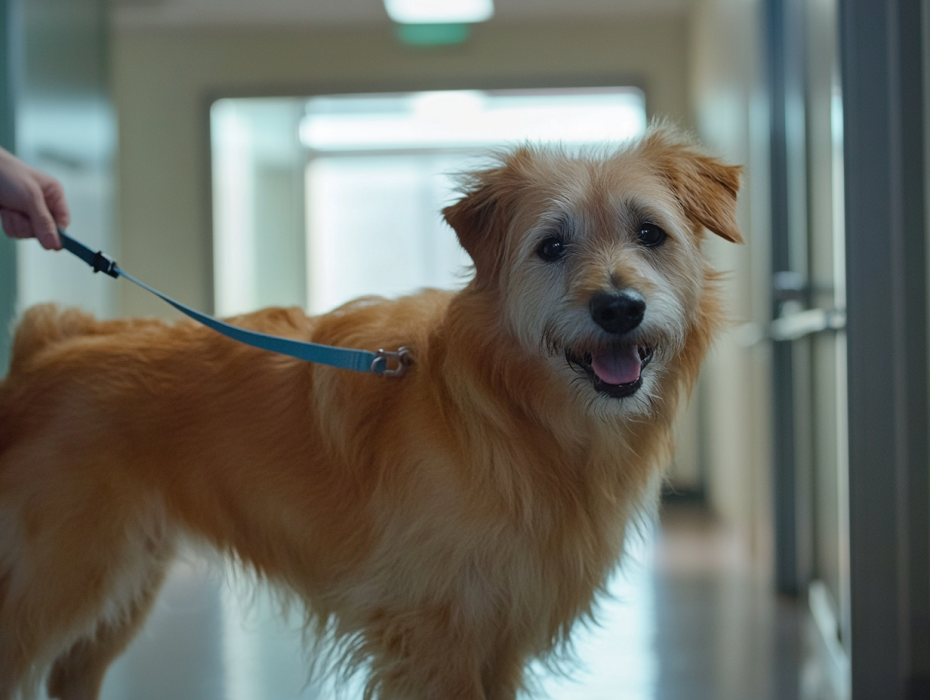
Parents of other patients began to complain. “It isn’t fair,” one said. “Why does our child only get five minutes while he spends an hour in there?” Maya didn’t have an answer. She simply promised to talk to the shelter, though she already knew it wouldn’t change anything.
One afternoon, an orderly tried to pull Milo away while Lily slept. The dog let out a deep growl, startling everyone nearby. The sound echoed down the hallway like a warning no one understood.

The ward supervisor threatened to end the program altogether. “One more incident,” she said, “and the dog goes.” Maya defended him fiercely. “He’s helping her,” she argued. “That’s all he’s doing. Can’t you see?” The supervisor wasn’t convinced but agreed to give it some more time.
When the room finally cleared, Maya sat beside Milo on the floor. “What are you protecting her from?” she whispered. The dog didn’t move. He just pressed his head against Lily’s bed, eyes half-closed, as if the answer was beating quietly beneath his ear.

Over the next few weeks, Lily’s health began to improve. She smiled more, laughed at small jokes, and even asked to go outside when the sun hit her window just right. But Milo grew quieter. He spent long stretches with his ear pressed to her chest, tail still, listening.
At first, Maya thought it was sweet. Then she noticed he barely blinked during those moments. It was as though he was measuring something only he could hear. Sometimes, when Lily slept, he’d lift his head suddenly, alert, and stare at her chest until the rhythm of her breathing calmed.

One stormy afternoon, the lights flickered across the ward. The emergency generators hummed, but briefly—too briefly—the monitors went black. Milo began barking wildly, claws scraping against the tile. His cries pierced through the storm just as Lily gasped for air.
Nurses rushed in. Within seconds, they had the machines rebooted, oxygen reconnected. Lily’s breathing steadied. When the chaos died down, they realized it was Milo’s frantic barking that had drawn them there in time. By the end of the day, everyone was calling him a hero.
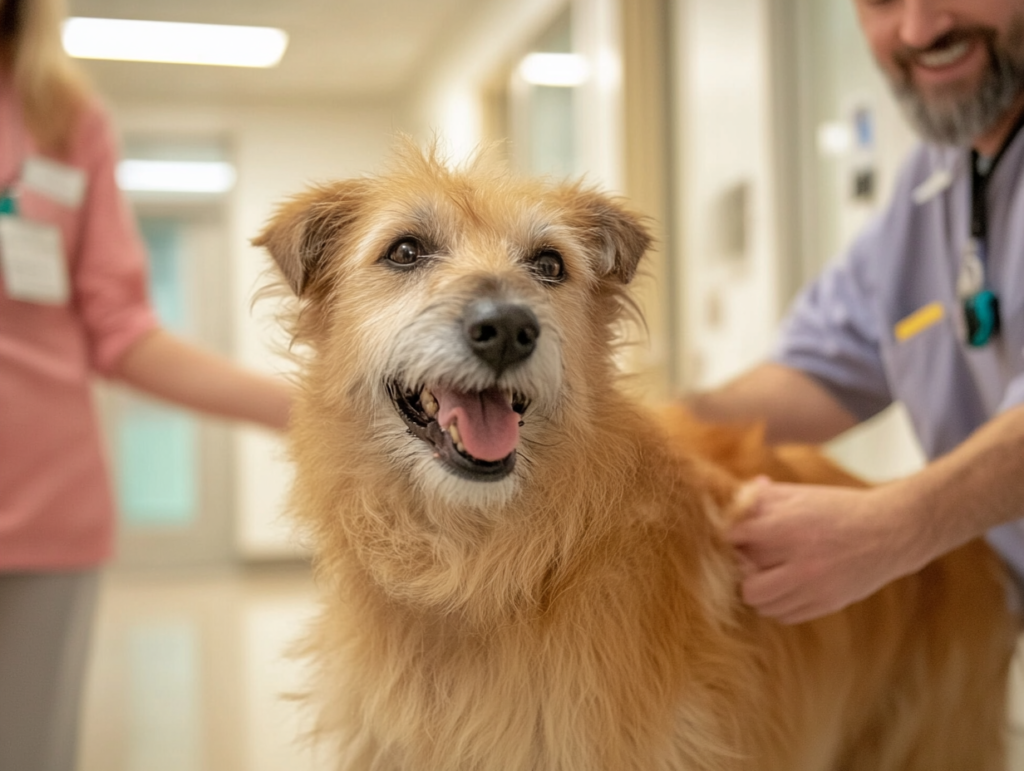
Maya smiled when she heard the stories spreading through the corridors. “He’s more than a hero,” she said softly, watching him sleep by Lily’s side. “He’s listening to her—to her body.” She was awed by what was happening.
That night, Maya dreamed of two heartbeats overlapping—one fading, one beginning, both trying to find the same rhythm. She woke before dawn, her own pulse racing, unable to shake the feeling that the dream wasn’t just about the girl, but about the dog, too.

The next morning, she went through Milo’s shelter file again, searching for something she might have missed. His intake date sat at the top of the page: two days before Lily’s surgery. Maya frowned. “Weird,” she murmured, tracing the line with her finger.
She knew it was silly. Paperwork coincidences meant nothing in hospitals. Dates overlapped constantly. Still, she felt that same tug she’d felt before, that quiet suggestion of connection whispering through the margins of every report she read.

She shook her head, laughing softly at herself. “You’re too rational for ghost stories,” she said aloud, closing the file. Yet, long after she turned off the light, she caught herself listening to the faint echo of Lily’s monitor from down the hall—steady, soft, alive.
Milo didn’t leave her mind that night. The earlier dream’s echo followed her into her shift the next morning, a steady rhythm she couldn’t unhear. She wondered if it was trying to tell her something.

By now, Lily had taken to drawing between naps. One afternoon, she handed Maya a sketch: herself, Milo, and a man running on a beach. “Who’s this?” Maya asked gently. “The man who runs with us,” Lily said matter-of-factly. “He wears red shoes.”
Maya smiled, but a chill pricked the back of her neck. Later that evening, she remembered the name she had written in her notes—Evan Reed—and out of curiosity, typed it into her computer again. This time, she found an online memorial.

There, smiling from the screen, was the same man Lily had drawn. Evan Reed stood barefoot on a beach, red running shoes in one hand, Milo at his side. The caption read: Forever running. Maya stared for a long moment before closing the page. How could Lily have known anything about him?
It was impossible, she told herself. Lily must have overheard a conversation, maybe even seen the photo by chance. Children picked up fragments of stories all the time. Still, when she returned to Lily’s room, she found Milo sitting by the window, staring out toward the horizon.

She could almost hear the sound of waves from the memory. It wouldn’t leave her head. It was as if the dog, too, remembered that beach. Maya turned off the light and left quietly, the question following her into the dark: What do you remember, Milo?
A few days later, the shelter sent updated paperwork. They had managed to contact Evan’s mother, Claire Reed. “She’s recovering from surgery herself,” the shelter worker explained. “She couldn’t keep the dog. She was too weak to manage him. It broke her heart to let him go.”

Maya listened quietly, imagining that moment—a grieving woman handing over the leash, saying goodbye to the last living piece of her son. The thought stayed with her long after the call ended.
Later that night, she reread the message about Claire, tracing the name with her thumb. She wondered what kind of woman could bear losing both her son and the dog who loved him. She felt a tug of sympathy and something else. It was a need to know more.

But she told herself that as a professional, there were some lines she should not cross. Patient confidentiality was in place for a reason. “Boundaries, Maya,” she muttered, half to herself. But as she walked past Lily’s room and saw Milo asleep beside her, the temptation to understand the story deepened.
That night, long after the ward had gone quiet, Maya sat alone in the break room, phone in hand. Her thumb hovered over the number the shelter had provided. She took a deep breath and dialed. If nothing else, she could speak to the last link who might know something.

When Claire finally answered, her voice trembled with age and emotion. “You have him?” she asked, almost in disbelief. “Our Milo?” Maya smiled softly. “Yes, ma’am. He’s with a little girl here at the hospital. He’s been incredible.”
Claire exhaled shakily, the sound half sob, half laughter. “I prayed someone kind would find him,” she said. “He used to sleep on my son’s chest every night—always over his heart. He was with him till the final moment. I just couldn’t bear to bring him home, not in my condition either.”

Claire continued after a brief sob, “Milo wouldn’t even eat those initial days, the shelter people told me.” Maya listened, a shiver running through her. The image of the dog, starved by grief, mirrored too clearly the one she knew. It was the same animal now guarding a child’s chest as if nothing else in the world mattered.
“I called just so you may know that he’s really doing a good job here. I’d like to keep him here with her,” Maya said softly. “If that’s all right.” There was a pause, then Claire’s gentle voice replied, “My son always had a purpose in life. Even his death wasn’t in vain; he had signed up to donate his heart. If Milo has found where he belongs, let him stay.”

When the call ended, Maya sat in silence, the phone still pressed to her ear. Outside the window, rain tapped softly against the glass. Somewhere down the hall, Milo barked, as if echoing the woman’s blessing. Maya was now fairly certain of one thing—that she should call back Claire and urge her to take one more step.
A week later, the therapy program faced another challenge. Complaints about noise and hygiene made their way to the administration, and the visits were nearly suspended. Maya argued until her voice shook, reminding them that Lily’s recovery had really improved since Milo’s arrival.

Lily’s doctor, a kind man with tired eyes, finally stepped in. “I would be lying if I denied it. The girl needs the dog,” he said simply. “You can analyze that however you like, but it’s the fact.” The program stayed, though under tighter supervision.
Milo’s protectiveness, however, only intensified. He began positioning himself between Lily and anyone who approached her too suddenly. Nurses learned to speak softly and move more slowly. It became routine, almost, until the day a technician dropped a metal tray beside the bed.

The crash startled everyone. Milo lunged with a snarl that froze the room. It lasted only a second. His teeth never touched anyone, but the sound, raw and wild, silenced the entire ward. It was the first time Maya felt real fear around him.
Later that day, she sat beside him in the dark, her hand resting on his back. “What are you so afraid of?” she whispered. The dog didn’t move. His eyes stayed fixed on Lily’s chest, where the faint rise and fall of her breathing matched the rhythm of his own.

A storm swept over the city that night, the kind that rattled windows and swallowed power lines. The lights flickered once, twice, then died. In the sudden dark, alarms wailed across the ward. Lily gasped, her body tensing as her monitors blinked to black.
Before anyone could react, Milo leapt onto the bed, pressing his paw gently against her chest. His growl was low, steady, and almost humming. The nurse’s flashlight beam caught the shimmer of his collar just as the backup power hummed to life.

The monitors blinked back on, showing a steady rhythm. Maya dropped to her knees beside them, her voice barely a whisper. “What are you hearing?” she asked. Milo didn’t move. His ear stayed pressed to Lily’s heartbeat, listening.
The next morning, Maya opened her email to find a message from Claire. The subject line read only: Thank you for your insistence. Her hands trembled as she clicked it open. Claire had spoken with the donation registry. The hospital had confirmed what she’d long suspected.

Claire’s son, Evan Reed, had been Lily’s heart donor. Maya read the line again and again, breathless. Every growl, every whine, every sleepless night—the puzzle fit together at last. Milo hadn’t been guarding the girl. He had been guarding the heart he already loved.
Maya waited a few days before making the call. With the hospital’s permission, she arranged a meeting between Claire and Lily’s family. She figured it was time for everyone to see the miracle she had seen. It was to be just a chance to thank someone who had given comfort in their hardest hour.
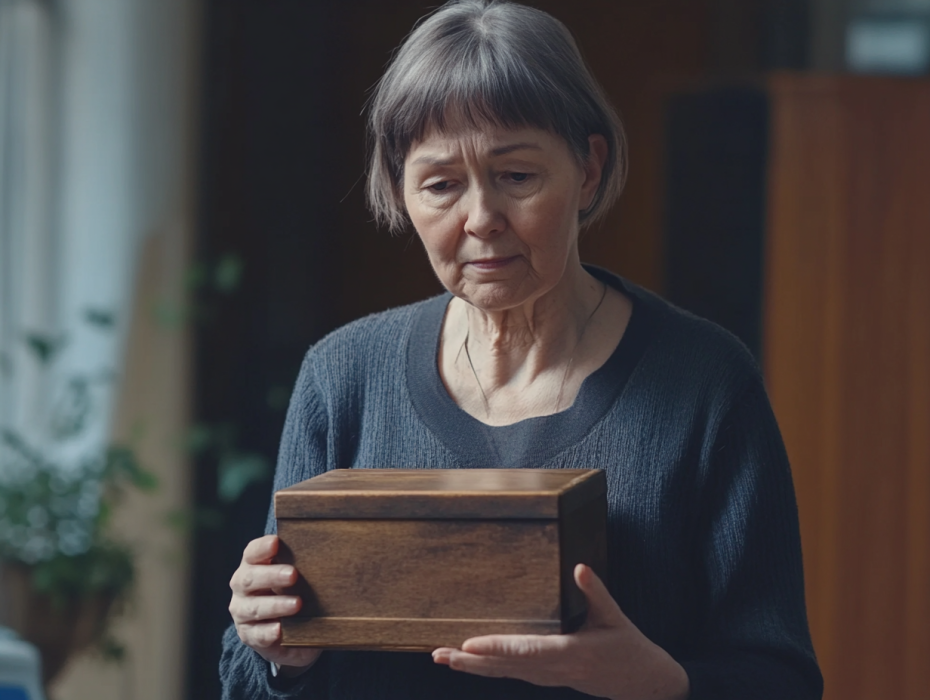
When Claire arrived, she looked fragile but carried a strange light in her eyes. She held a small wooden box in her lap. The moment Milo saw her, his whole body stilled. Then, without hesitation, he trotted forward and pressed his head into her knees.
Claire bent over him, whispering his name through tears. “He knows me,” she said softly. Her trembling hand stroked the top of his head. “He’s been listening for that heartbeat all along.” Milo licked her wrist once, then turned and walked straight back to Lily’s side.

For a few quiet minutes, the room seemed to breathe as one. Claire smiled at the girl on the bed, at the life that had somehow entwined with her son’s through this loyal creature. The air was thick with understanding, though no one dared speak it aloud.
Claire took a brief moment to get Lily’s parents’ consent before speaking to her. There were no secrets left to hide. She entered Lily’s room carrying white flowers and that same wooden box. “I think you should know,” she said gently, kneeling beside the bed. “You carry my son’s heart.”

Lily’s parents smiled through their tears. Her mother covered her mouth, tears spilling before a word could form. Lily looked down at her chest, fingers brushing the faint scar. “That’s why he wouldn’t leave me,” she whispered, voice shaking.
Claire nodded, crying quietly. “He followed the sound he knew,” she said. “He found you because he never stopped listening.” Lily reached out and took her hand. Milo lay between them, head low, eyes soft, as if finally at peace. Claire opened the box and gave her an old, used ball, “My son trained Milo to fetch using this. You keep it now.”
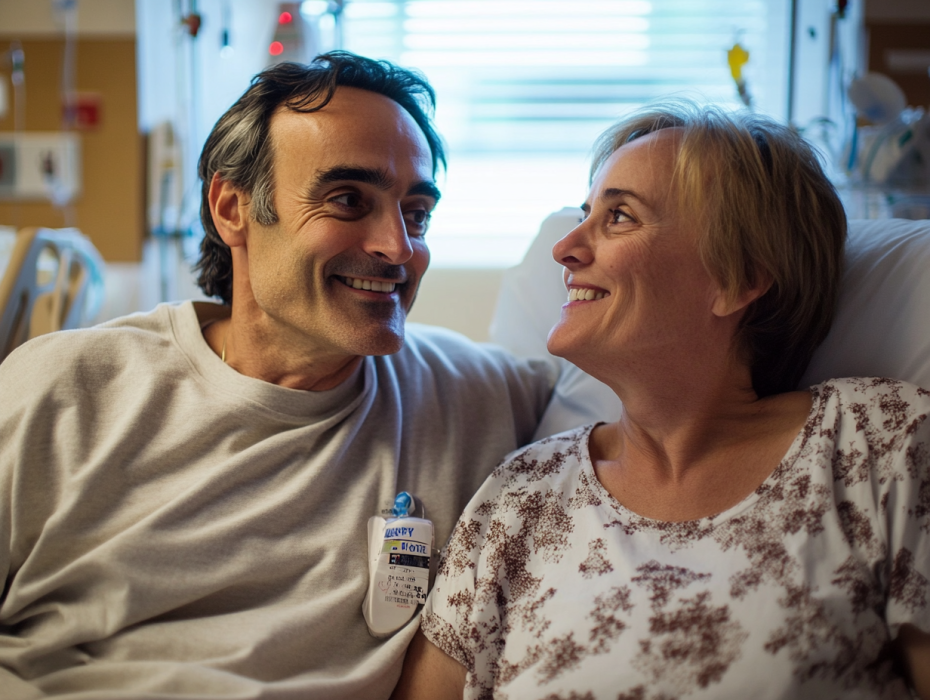
The two families stayed in that room for a long time. No words were needed. It was just gratitude, shared in silence. In that moment, everyone seemed to understand something larger than explanation: love, once given, never really left. It only changed its home.
Maya stood by the doorway, watching as Milo dozed off between them, his chest rising in rhythm with Lily’s. For the first time, she felt the ward itself grow still, as if even the building were listening.

When the meeting ended, Maya helped Claire to the elevator. “Thank you for letting me see him and her,” Claire said. “I can go home now. My son lives on in her.” Maya squeezed her hand, unable to find the words for all that she felt.
The days that followed felt lighter. Lily’s strength returned faster than anyone expected. She walked the ward each morning, Milo’s leash in her hand, the two of them moving at the same steady pace. Staff began calling them “the miracle pair.”

Parents of other patients smiled when they passed. Even the most skeptical doctors lingered in doorways to watch. The quiet faith that had settled over the ward spread from room to room, a reminder that sometimes healing came in forms no one could chart.
When discharge day arrived, the nurses gathered to say goodbye. Lily sat in her wheelchair, Milo trotting beside her, his tag catching the sunlight with every step. Applause broke out softly, then faded into tears and smiles as the doors closed behind them.

From the window above, Maya watched them cross the courtyard—the small girl in her bright jacket, the dog glued to her side. Their shadows stretched long across the pavement, slow and steady, like the rhythm of two hearts beating as one.
She thought about everything she’d witnessed: the growls, the storms, the quiet moments no one could explain. Maybe, she decided, not everything sacred needed scientific proof. Some answers arrived only when you stopped demanding them.

One evening, Maya went by invitation to Lily’s home. Lily’s laughter drifted through the open window, and Milo was prancing around her. Somewhere, far beyond that small room, a mother and her son both rested a little easier, Maya thought.
